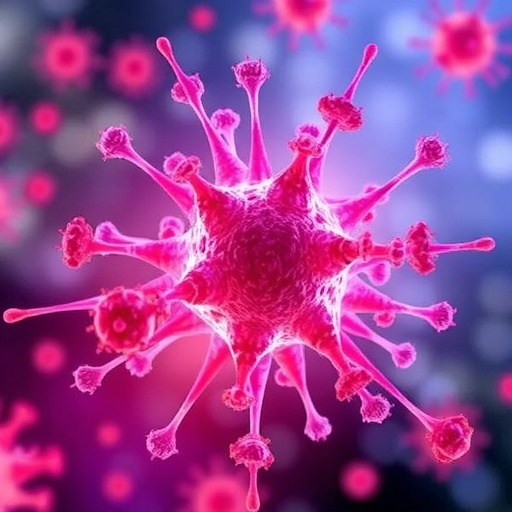In a groundbreaking advancement poised to redefine cancer immunotherapy, researchers at the Mayo Clinic have unveiled critical insights into the modulation of immune responses via specific myeloid cells, providing a new frontier for enhancing the efficacy of current cancer treatments. This novel approach focuses on leveraging the power of “first-responder” myeloid cells to amplify the activity of cytotoxic T cells, which are essential warriors in the body’s fight against malignancies. The discovery challenges conventional paradigms in immuno-oncology, promising more durable and robust immune checkpoint therapies.
Immunotherapy, especially checkpoint blockade therapies targeting proteins such as PD-1 and PD-L1, has revolutionized cancer treatment by reactivating the immune system’s ability to recognize and destroy tumors. However, one major hurdle remains: the development of resistance and the often-transient nature of treatment response. The Mayo Clinic’s dual-lab approach addresses this obstacle with unprecedented precision by honing in on the less-explored role of myeloid cells in tumor immunology.
Recent investigations published in the Journal for ImmunoTherapy of Cancer delineate how PD-L1, a critical immunosuppressive ligand, is abundantly expressed on myeloid cells and undergoes a natural cellular recycling process that diminishes the lasting impact of PD-L1 blockade drugs. This recycling effectively replenishes PD-L1 on the cell surface, allowing tumors to evade immune destruction even in the face of checkpoint inhibitors. To combat this, researchers developed H1A, a novel antibody that inhibits this recycling mechanism, resulting in the targeted degradation of PD-L1 on myeloid cells.
This antibody-mediated disruption of PD-L1 recycling represents a significant leap forward in immunotherapy design. By effectively removing this immunosuppressive checkpoint from myeloid cells, H1A unleashes an enhanced activation of these immune “first responders,” which in turn amplify the function and proliferation of cytotoxic T cells. The expanded and invigorated T cell population holds the potential to eradicate tumors more effectively and sustain long-term immune surveillance.
Dr. Haidong Dong, lead investigator and cancer immunologist at Mayo Clinic Comprehensive Cancer Center, emphasizes that understanding and targeting the intracellular recycling pathway of PD-L1 unveils a critical vulnerability in the tumor microenvironment. This novel insight lays the foundation for therapeutic strategies that transcend the limitations of current PD-1/PD-L1 targeting agents, marking a transformative moment in immuno-oncology research.
In parallel, the research team led by Dr. Jessica Lancaster at Mayo Clinic in Arizona explores the dynamic interplay between macrophages—a subset of myeloid cells—and T cells within the tumor microenvironment. Employing sophisticated live-cell microscopy, their studies reveal that macrophages not only act as antigen-presenting immune cells but also create a molecular milieu that potentiates the tumor-killing ability of T cells. This intimate crosstalk fosters a pro-inflammatory environment conducive to effective antitumor responses.
Their observations challenge the long-held conception that tumor cells and T cells exclusively orchestrate the immune checkpoint axis. Instead, these findings position macrophages as pivotal agents capable of being “reprogrammed” into more potent allies. By manipulating macrophage phenotypes toward a pro-inflammatory state, it becomes possible to overcome tumor-induced immune suppression and resist therapeutic resistance.
Such macrophage reprogramming could herald a paradigm shift in therapeutic interventions. If these immune cells can be coaxed into enhancing T cell activation, they may serve as critical adjuncts to existing treatments, overcoming both primary and acquired resistance to checkpoint inhibitors. The implications extend beyond improved tumor control, potentially transforming patient prognoses across multiple cancer types.
Taken together, the complementary discoveries from these two research teams fortify the concept that myeloid cells—often sidelined in immunotherapy strategies—play an indispensable role in regulating T cell-mediated tumor immunity. By targeting the PD-L1 recycling pathway and guiding macrophage activation states, these findings chart a novel route to optimize immunotherapies and mitigate their current shortcomings.
Spurred by these promising results, Mayo Clinic has initiated plans for a Phase 1 clinical trial to assess the safety and efficacy of the H1A antibody in humans. This pivotal step aims to translate the laboratory’s transformative insights into real-world clinical benefits, offering hope for patients whose cancers have proven refractory to existing therapies.
If successful, this approach could expand the arsenal of immuno-oncology treatments, providing a versatile platform for combination therapies that enhance anti-cancer immunity without compromising safety. It also opens avenues for personalized medicine strategies tailored to manipulate individual tumor microenvironments for maximal therapeutic impact.
The research contributes significantly to the evolving understanding of immune checkpoint biology by illuminating the molecular underpinnings of PD-L1 regulation beyond tumor cells. By acknowledging and targeting immune-suppressive behaviors intrinsic to myeloid populations, it broadens the landscape of immune modulation and introduces novel molecular targets for drug development.
As the scientific community continues to decipher the complexities of tumor immunology, these findings underscore the necessity of integrating multiple immune cell types and pathways. The robust collaboration between distinct yet convergent research efforts exemplifies the power of interdisciplinary approaches to confronting the profound challenges presented by cancer.
Mayo Clinic’s commitment to innovation in cancer research is exemplified by these discoveries, which resonate with the institution’s mission to deliver patient-centered and cutting-edge therapies. These studies exemplify the blending of fundamental immunologic principles with translational research to forge effective new treatments that could redefine cancer care globally.
This body of work not only enriches the field of immunotherapy but also inspires new lines of inquiry into immune regulation within the tumor niche. By harnessing the capabilities of myeloid cells and thwarting immune evasion strategies, a new era of enhanced and sustained cancer immunotherapies is on the horizon, promising life-changing advances for patients worldwide.
Subject of Research: Immune modulation of myeloid cells to enhance cancer immunotherapy efficacy
Article Title: Targeting PD-L1-CMTM6 Interactions in Myeloid Cells Triggers PD-L1 Degradation and Enhances Cytotoxic T-Cell Expansion
News Publication Date: October 28, 2025
Web References:
Journal for ImmunoTherapy of Cancer, https://jitc.bmj.com/content/13/10/e012164
iScience, https://www.sciencedirect.com/science/article/pii/S2589004225017997
Keywords: Cancer Immunotherapy, Myeloid Cells, PD-L1 Recycling, Checkpoint Inhibitors, Cytotoxic T Cells, Macrophage Reprogramming, Immune Evasion, H1A Antibody, Tumor Microenvironment, Immuno-oncology, Molecular Immunology, Resistance Mechanisms
Tags: cancer immunotherapy advancementsdurable cancer treatment responsesenhancing cytotoxic T cellsfirst-responder myeloid cellsimmune checkpoint therapiesimmunosuppressive ligands in tumorsJournal for ImmunoTherapy of CancerMayo Clinic cancer researchmyeloid cell modulationPD-1 and PD-L1 blockaderesistance in cancer treatmenttumor immunology insights





